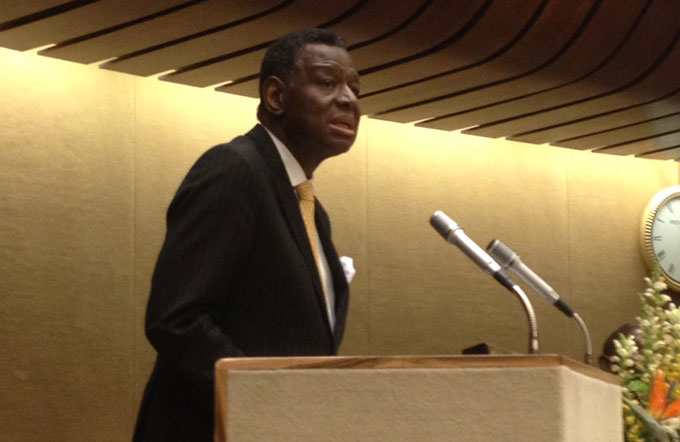News
Violence against women and girls: enough is enough, says UNFPA Head
- 25 June 2014
News
UNITED NATIONS, New York – UNFPA Executive Director Dr. Babatunde Osotimehin, in his remarks to government and United Nations officials today, underlined the need for urgent and intensified efforts to end gender-based violence and discrimination.
"Is there a tipping point? When will we finally say ‘enough’ to violence and discrimination against women and girls?” Dr. Osotimehin said at the 2014 annual session of the Executive Board of UNFPA, the UN Development Programme and the UN Office for Project Services, taking place this week in Geneva.
Gender-based violence is one of the most prevalent human rights violations in the world.

“One out of every three women in the world, in every country and from every background, will experience physical or sexual violence in her lifetime,” Dr. Osotimehin emphasized.
“They are not safe at school, not safe fetching water, not safe on a university campus, not even on the steps of a courthouse or in their own homes.”
A long shadow
These crimes cast a long shadow.
Survivors of intimate partner violence, for example, face increased risks of HIV and other sexually transmitted infections, and their children have worse health outcomes, according to studies by the World Health Organization, the World Bank and others.
Both gender-based violence and entrenched discrimination create barriers to jobs and education, perpetuating a cycle of injustice that can stretch over generations.
“When will we finally bring back our girls – all our girls and women – to their schools, to the workforce, to their rightful place alongside men and boys at the table where decisions are made, and away from child marriage, away from early pregnancy, away from HIV infection, away from violence and harmful practices that strip them of their dignity and, in the worst cases, deprive them of their lives?" Dr. Osotimehin said.
Equality the key to development
This year marks the 20th anniversary of the International Conference on Population and Development (ICPD), where a consensus placed individuals – and their human rights – at the centre of development efforts.
“2014 was an important year for UNFPA, particularly in relation to the ICPD,” said Peter Thomson, President of the Executive Board and Permanent Representative of Fiji to the United Nations.
A global review, released earlier this year, revealed “the achievement made and the challenges that remain two decades after the landmark ICPD,” Mr. Thomson noted. The review found improvements in the health and status of women and girls – but, as Dr. Osotimehin said in his remarks, “we still have a long way to go.”
Nowhere in the world are women fully equal to men in political, social or economic power, according to the review. These inequalities stand in the way of development, limiting progress on a variety of efforts – from the elimination of child marriage to the provision of universal access to sexual and reproductive health services.
“It is crucial that we address the persistent discrimination and inequalities hitting the poorest and most marginalized among us,” the Executive Director said. “And it is vital that we uphold the rights of women, girls and all young people – for their own dignity and well-being, but also because doing so is the key to meeting any future development goals.”